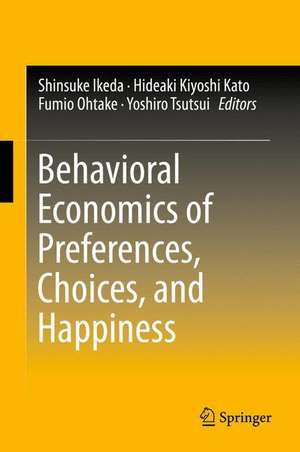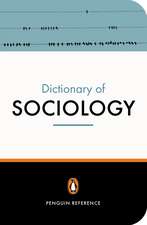Behavioral Economics of Preferences, Choices, and Happiness
Editat de Shinsuke Ikeda, Hideaki Kiyoshi Kato, Fumio Ohtake, Yoshiro Tsutsuien Limba Engleză Hardback – 20 ian 2016
| Toate formatele și edițiile | Preț | Express |
|---|---|---|
| Paperback (1) | 801.97 lei 6-8 săpt. | |
| Springer – 30 mar 2018 | 801.97 lei 6-8 săpt. | |
| Hardback (1) | 729.99 lei 38-44 zile | |
| Springer – 20 ian 2016 | 729.99 lei 38-44 zile |
Preț: 729.99 lei
Preț vechi: 960.51 lei
-24% Nou
Puncte Express: 1095
Preț estimativ în valută:
139.68€ • 145.85$ • 115.34£
139.68€ • 145.85$ • 115.34£
Carte tipărită la comandă
Livrare economică 11-17 aprilie
Preluare comenzi: 021 569.72.76
Specificații
ISBN-13: 9784431554011
ISBN-10: 4431554017
Pagini: 713
Ilustrații: XX, 717 p. 90 illus., 45 illus. in color.
Dimensiuni: 155 x 235 x 40 mm
Greutate: 1.2 kg
Ediția:1st ed. 2016
Editura: Springer
Colecția Springer
Locul publicării:Tokyo, Japan
ISBN-10: 4431554017
Pagini: 713
Ilustrații: XX, 717 p. 90 illus., 45 illus. in color.
Dimensiuni: 155 x 235 x 40 mm
Greutate: 1.2 kg
Ediția:1st ed. 2016
Editura: Springer
Colecția Springer
Locul publicării:Tokyo, Japan
Public țintă
GraduateCuprins
Part I Attitude toward Risk and Time.- 1 Risk and Time Preferences: Linking Experimental and Household Survey Data from Vietnam (Tanaka, Camerer, Nguyen).- 2 Simultaneous Measurement of Time and Risk Preferences: Stated Preference Discrete Choice Modeling Analysis Depending on Smoking Behavior (Ida, Goto).- 3 Time discounting: Declining impatience and interval effect (Kinari, Ohtake, Tsutsui).- 4 Non-parametric Test of Time Consistency: Present Bias and Future Bias (Takeuchi, Kan).- 5 Loss of self-control in intertemporal choice may be attributable to logarithmic time-perception (Takahashi).- 6 Experiments on Risk Attitude : the Case of Chinese Students (Sasaki, Xie, Ohtake, Qin, Tsutsui).-Part II Addiction.- 7 Interdependency among Addictive Behaviors and Time/Risk Preferences: Discrete Choice Model Analysis of Smoking, Drinking, and Gambling (Ida, Goto).- 8 Discounting delayed and probabilistic monetary gains and losses by smokers of cigarettes (Ohmura, Takahashi, Kitamura).- 9 Time discounting and smoking behavior: Evidence from a panel survey (Kang, Ikeda).- 10 Smokers, smoking deprivation, and time discounting (Yamane, Yoneda, Takahashi, Kamijo, Komori, Hiruma, Tsutsui).- 11 The effects of the social norm on cigarette consumption: Evidence from Japan using panel data (Yamamura).-Part III Health.- 12 Hyperbolic discounting, the sign effect, and the body mass index (Ikeda, Kang, Ohtake).- 13 Economic and Behavioral Factors in an Individual's Decision to Take the Influenza Vaccination in Japan (Tsutsui, Benzion, Shahrabani).- Part IV Social Preferences.- 14 Another Avenue for Anatomy of Income Comparisons: Evidence from Hypothetical Choice Experiments (Yamada, Sato).- 15 Social capital, household income, and preferences for income redistribution (Yamamura).- Part V Happiness and Well-being.- 16 Koizumi Carried the Day: Did the Japanese Election Results Make People Happy and Unhappy? (Tsutsui, Kimball, Ohtake).- 17 Asking about changes in happiness in a daily web survey and its implication for the Easterlin paradox (Tsutsui, Ohtake).- 18 Welfare States and the Redistribution of Happiness (Ono, Lee).-Part VI Decisions.- 19 Revealed Attention (Yusufcan, Nakajima, Ozbay).- 20 Subjective random discounting and intertemporal choice (Higashi, Hyogo, Takeoka).- 21 A geometric approach to temptation (Abe).- Part VII Biological Foundation.- 22 Prediction of immediate and future rewards differently recruits cortico-basal ganglia loops (Tanaka, Doya, Okada, Ueda, Okamoto, Yamawaki).- 23 Second to fourth digit ratio and the sporting success of sumo wrestlers (Tamiya, Lee, Ohtake).-Part IIX Investor Behavior.- 24 Investors' Herding on the Tokyo Stock Exchange (Iihara, Kato, Tokunaga).- 25 The characteristics of online investors (Uchida).-26 Can margin traders predict future stock returns in Japan? (Hirose, Kato, Bremer).
Notă biografică
Editors
Shinsuke Ikeda is a professor at the Institute of Social and Economic Research (ISER), Osaka University and serves as the director of the Research Centre of Behavioral Economics in ISER. He got a B.Com. of Kobe University in 1980 and a Ph.D. (Doctor) of Osaka University (economics) in 1997. He was the former president of the Association of Behavioral Economics and Finance. He published articles on behavioral economics, macroeconomic dynamics, and asset pricing in Journal of Finance, Journal of Health Economics, Journal of International Economics, Journal of Monetary Economics, International Economic Review, etc. His work on behavioral economics is incorporated into the book Economics of Self-Destructive Choices, Springer, to appear in 2015.
Hideaki Kiyoshi Kato is a professor of finance at Graduate School of Economics, Nagoya University, Nagoya, Japan. Before joining Nagoya University, he taught at Kobe University. He received his Ph.D. degree from the University of Utah in 1985. He has published several books and more than 30 articles in the leading finance journals such as Review of Financial Studies, Management Science, Journal of Financial Economics, Journal of Financial and Quantitative Analysis, International Review of Finance, Japan and the World Economy, Pacific Basin Finance Journal, Journal of Portfolio Management, Journal of Financial Research, Journal of Banking and Finance, and Journal of Futures Markets on subjects including the market efficiency and anomalies, stock options, investor behavior, dividend policy, equity offerings, and stock index futures. He is currently an associate editor of Pacific Basin Finance Journal and International Review of Finance.
Fumio Ohtake is Osaka University distinguished professor and a professor in the Institute of Social and Economic Research at Osaka University and an executive vice president of Osaka University. He earned his M.A. and a Ph.D. from Osaka University in 1985 and 1996, respectively, and a B.A. from Kyoto University in 1983. He is the president of the Association of Behavioral Economics and Finance, and an executive director of the Japanese Economic Association. His research topics are behavioral economics, labor economics, income distribution, and household behavior. He is also a recipient of the 2005 Nikkei Prize for Excellent Books in Economic Science; the 2005 Suntory Prize for Social Science and Humanities; the 2005 Economist Prize; the 2006 Ishikawa Prize of the Japanese Economic Association; and the 2008 Japan Academy Prize.
Yoshiro Tsutsui is a professor of economics at Konan University. He had previously taught at Nagoya City University and Osaka University. He was awarded a Ph.D. (economics) from Osaka University. He was the first president of the Association of Behavioral Economics and Finance, and the president of Japan Society of Monetary Economics. His primary areas of teaching and research are behavioral economics and banking and finance. Currently, his research includes happiness study, time discounting, international linkage of stock prices, and regional banking and finance. His publications appeared in Review of Economics and Statistics, Journal of Financial and Quantitative Analysis, Journal of Banking and Finance, Journal of Risk and Uncertainty, Regional Science and Urban Economics, and Journal of Research in Personality. In 1988, his book, The Financial Markets and Banking Industry: Economic Analysis of Industrial Organization (Toyokeizai-Shinpo Sha, in Japanese) was awarded the Nikkei Prize for Excellent Books in Economic Science.
Shinsuke Ikeda is a professor at the Institute of Social and Economic Research (ISER), Osaka University and serves as the director of the Research Centre of Behavioral Economics in ISER. He got a B.Com. of Kobe University in 1980 and a Ph.D. (Doctor) of Osaka University (economics) in 1997. He was the former president of the Association of Behavioral Economics and Finance. He published articles on behavioral economics, macroeconomic dynamics, and asset pricing in Journal of Finance, Journal of Health Economics, Journal of International Economics, Journal of Monetary Economics, International Economic Review, etc. His work on behavioral economics is incorporated into the book Economics of Self-Destructive Choices, Springer, to appear in 2015.
Hideaki Kiyoshi Kato is a professor of finance at Graduate School of Economics, Nagoya University, Nagoya, Japan. Before joining Nagoya University, he taught at Kobe University. He received his Ph.D. degree from the University of Utah in 1985. He has published several books and more than 30 articles in the leading finance journals such as Review of Financial Studies, Management Science, Journal of Financial Economics, Journal of Financial and Quantitative Analysis, International Review of Finance, Japan and the World Economy, Pacific Basin Finance Journal, Journal of Portfolio Management, Journal of Financial Research, Journal of Banking and Finance, and Journal of Futures Markets on subjects including the market efficiency and anomalies, stock options, investor behavior, dividend policy, equity offerings, and stock index futures. He is currently an associate editor of Pacific Basin Finance Journal and International Review of Finance.
Fumio Ohtake is Osaka University distinguished professor and a professor in the Institute of Social and Economic Research at Osaka University and an executive vice president of Osaka University. He earned his M.A. and a Ph.D. from Osaka University in 1985 and 1996, respectively, and a B.A. from Kyoto University in 1983. He is the president of the Association of Behavioral Economics and Finance, and an executive director of the Japanese Economic Association. His research topics are behavioral economics, labor economics, income distribution, and household behavior. He is also a recipient of the 2005 Nikkei Prize for Excellent Books in Economic Science; the 2005 Suntory Prize for Social Science and Humanities; the 2005 Economist Prize; the 2006 Ishikawa Prize of the Japanese Economic Association; and the 2008 Japan Academy Prize.
Yoshiro Tsutsui is a professor of economics at Konan University. He had previously taught at Nagoya City University and Osaka University. He was awarded a Ph.D. (economics) from Osaka University. He was the first president of the Association of Behavioral Economics and Finance, and the president of Japan Society of Monetary Economics. His primary areas of teaching and research are behavioral economics and banking and finance. Currently, his research includes happiness study, time discounting, international linkage of stock prices, and regional banking and finance. His publications appeared in Review of Economics and Statistics, Journal of Financial and Quantitative Analysis, Journal of Banking and Finance, Journal of Risk and Uncertainty, Regional Science and Urban Economics, and Journal of Research in Personality. In 1988, his book, The Financial Markets and Banking Industry: Economic Analysis of Industrial Organization (Toyokeizai-Shinpo Sha, in Japanese) was awarded the Nikkei Prize for Excellent Books in Economic Science.
Textul de pe ultima copertă
This book is a collection of important contributions by Japanese researchers and their coauthors to present current advances in behavioral economics and finance, particularly in relation to decision making and human well-being. The topics covered in this volume include decision making under the conditions of inter-temporal choices, risk, and social relations, happiness, and the neuro-scientific/biological basis of behavior. The book includes works of research, both theoretical and empirical, on time discounting, time preferences, risk aversion, altruism, social status, happiness, addiction, limited attention, and health and financial investments. The authors of the chapters add supplementary discussions to survey more recent advances on related topics or to provide detailed information that were abbreviated in the original publications. The addenda will enable readers to deepen their understanding of decision making and human well-being.
Caracteristici
Collects for the first time works on behavioral economics/finance by representative Japanese authors
Adds and expounds original supplementary data on related research and recent advances for all topics
Covers a broad range of topics from behavioral economics to finance and from preferences to happiness
Adds and expounds original supplementary data on related research and recent advances for all topics
Covers a broad range of topics from behavioral economics to finance and from preferences to happiness















